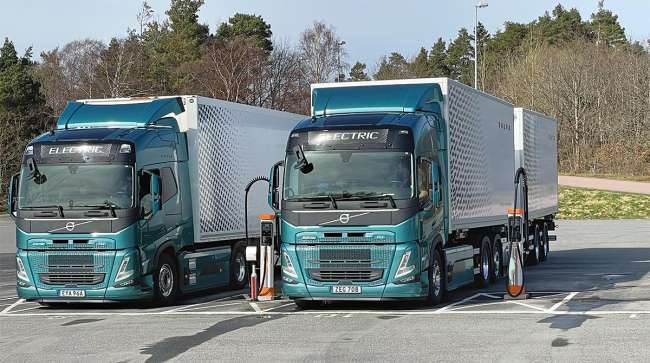Staff Reporter
Volvo Group Price Increases Aid Q1 Profits

[Stay on top of transportation news: Get TTNews in your inbox.]
Profits at truck maker Volvo Group in the first quarter of 2024 received a boost from price increases, even as orders and deliveries declined as expected.
Gothenburg, Sweden-based Volvo Group posted net income of $1.29 billion in the first quarter, compared with $1.18 billion a year earlier. The original equipment manufacturer’s earnings are reported in Swedish kronor, and conversions are correct as of April 17.
Analysts applauded the results and pricing strategy during the company’s quarterly earnings call.
Volvo Group’s net sales revenue for trucks, buses and construction equipment in the most recent quarter totaled $11.97 billion, unchanged from a year earlier. Of those sales, trucks accounted for $8.20 billion, compared with $8.17 billion in Q1 2023.
Q1 2024: Good profitability on lower volumes. https://t.co/cuUzmETzLj#VolvoGroupReport #fintwit #financialreport #quarterlyreport #q1 #volvo pic.twitter.com/UOG5l4i0FY — Volvo Group (@VolvoGroup) April 17, 2024
The company’s truck business posted an operating margin of 14.5% in Q1, compared with 14.4% in the same period in 2023.
North American truck sales revenue in the most recent quarter totaled $2.48 billion, down 1% compared with the year-ago period’s $2.51 billion.
Volvo Group’s truck deliveries globally fell 10% to 55,500 in Q1 from 61,500 in the year-ago period.
The company delivered 15,056 trucks in North America in Q1, down 6% from 16,011 a year earlier.
Of that total, Volvo Trucks North America contributed 7,881, down 5% compared with 8,306 a year earlier, while Mack Trucks deliveries fell 7% to 7,153 from 7,655.
Volvo Group estimates 71,329 heavy-duty trucks were sold on a retail basis in North America in the first three months of the year, down 10% from the year-ago period’s 79,433 trucks. The OEM kept its forecast for the full-year period unchanged at 290,000, compared with 2023’s total of 330,792.

Lundstedt
“Demand continued to normalize across many of the group’s markets” during Q1, CEO Martin Lundstedt said in a presentation.
The normalization was due to transport volumes and freight rates coming down from previously very high levels, the company said in its earnings report.
“Many fleets continue their replacements, while retail customers are more in a wait-and-see mode. Utilization of the installed truck fleet remains on good levels,” it added.
In Q1, Volvo Group global truck net order intake declined by 19% to 48,701 units.
Order intake in North America decreased by 37% to 9,620 trucks with VTNA orders falling 9% year-over-year to 6,909 from 7,554 trucks.
But orders at Mack Trucks in North America dived 64% to 2,685 from 7,555 a year earlier.
Mack Trucks’ order intake was impacted by a strike in the fourth quarter of 2023 as already sold production slots were moved from 2023 into 2024 and by Mack Trucks being restrictive in order slotting because of long lead times, Volvo Group said.
Mack Trucks management decided to be very restrictive with its order book in Q1 as a result of moving the Q4 slots into the most recent quarter, Lundstedt said during the call.
VTNA’s heavy-duty truck market share increased to 9.1% from 8.7%, while Mack Trucks’ market share declined to 5.3% from 5.7%.
Volvo Group expects the subsidiaries to increase their market share as Mack Trucks recovers from the impact of the strike and due to the redesign of VTNA’s flagship VNL tractor, which was launched in January and saw order books open April 15.
Earlier in April, Volvo Group said it planned to open a production facility in Mexico because of optimism about both VTNA and Mack Trucks’ prospects in North America and opportunities for the latter in Latin America and South America.
“Demand continued to normalize across many of the group’s markets during quarter one,” says Martin Lundstedt, President and CEO, Volvo Group.#VolvoGroupReport #quarterlyreport #q1 #stocks #stockmarket #fintwithttps://t.co/qcxMkgzMD4 — Volvo Group (@VolvoGroup) April 17, 2024
Lundstedt and Chief Financial Officer Mats Backman declined during the earnings call to provide details on where in Mexico the plant would be located, its capacity or how much it would cost to build.
However, Lundstedt said, “We need a structural upgrade of our capacity, since in the last periods our market share has been decided by our value chain capacity and that cannot be the case.
“In order to support our market share ambitions, and with the investments we have made in our product ranges, there is a good opportunity to grow our market share. … Now is the time to take the next step.”
Lundstedt also expressed optimism about the company’s ability to retain production flexibility, cost control and pricing discipline while also investing in new technologies.
That includes battery-electric trucks and internal combustion engines running on alternative fuels. In Q1, Volvo finalized the acquisition of Proterra’s battery business and signed a final joint venture agreement with high-pressure, gas-injection fuel system developer Westport Fuel Systems.
Want more news? Listen to today's daily briefing below or go here for more info:




